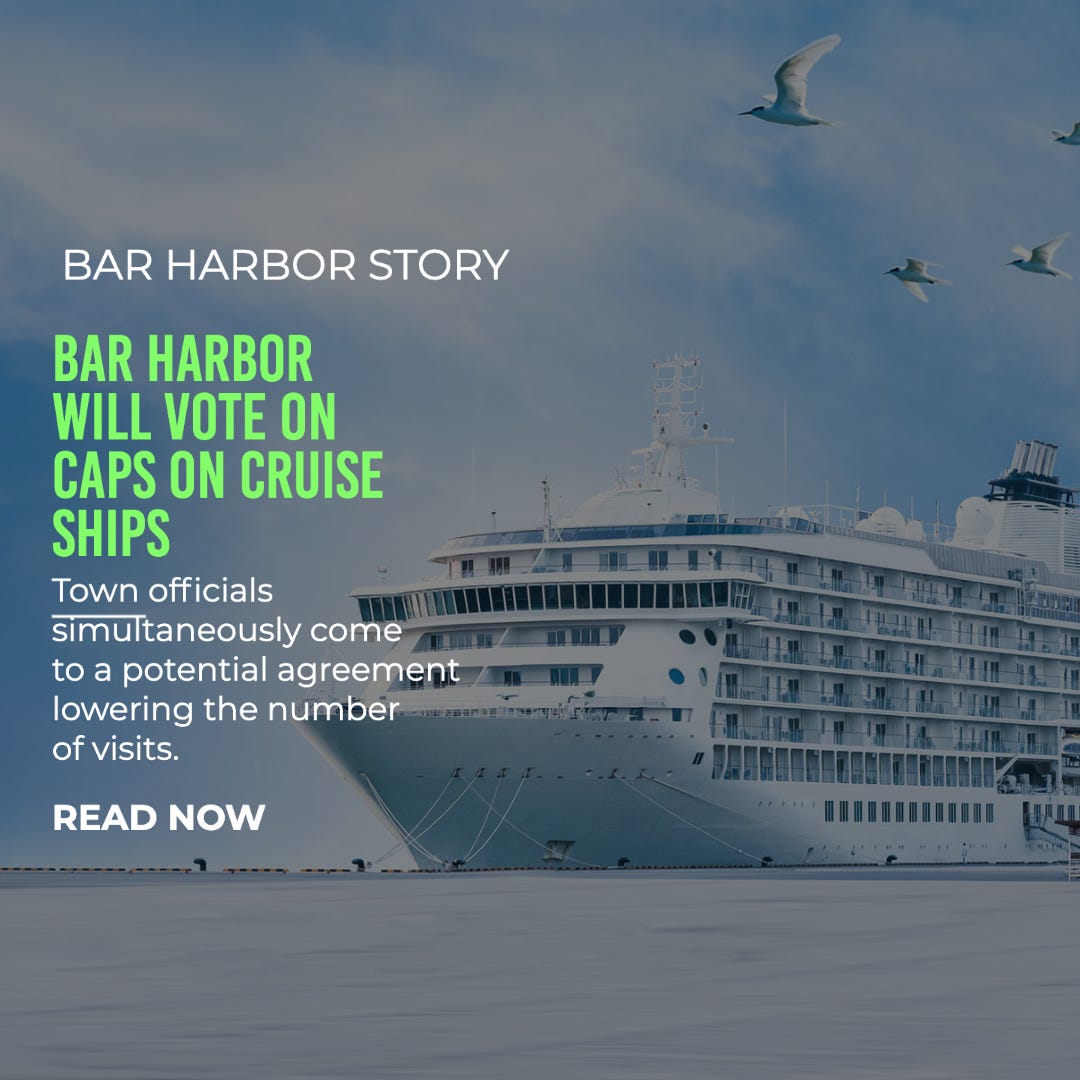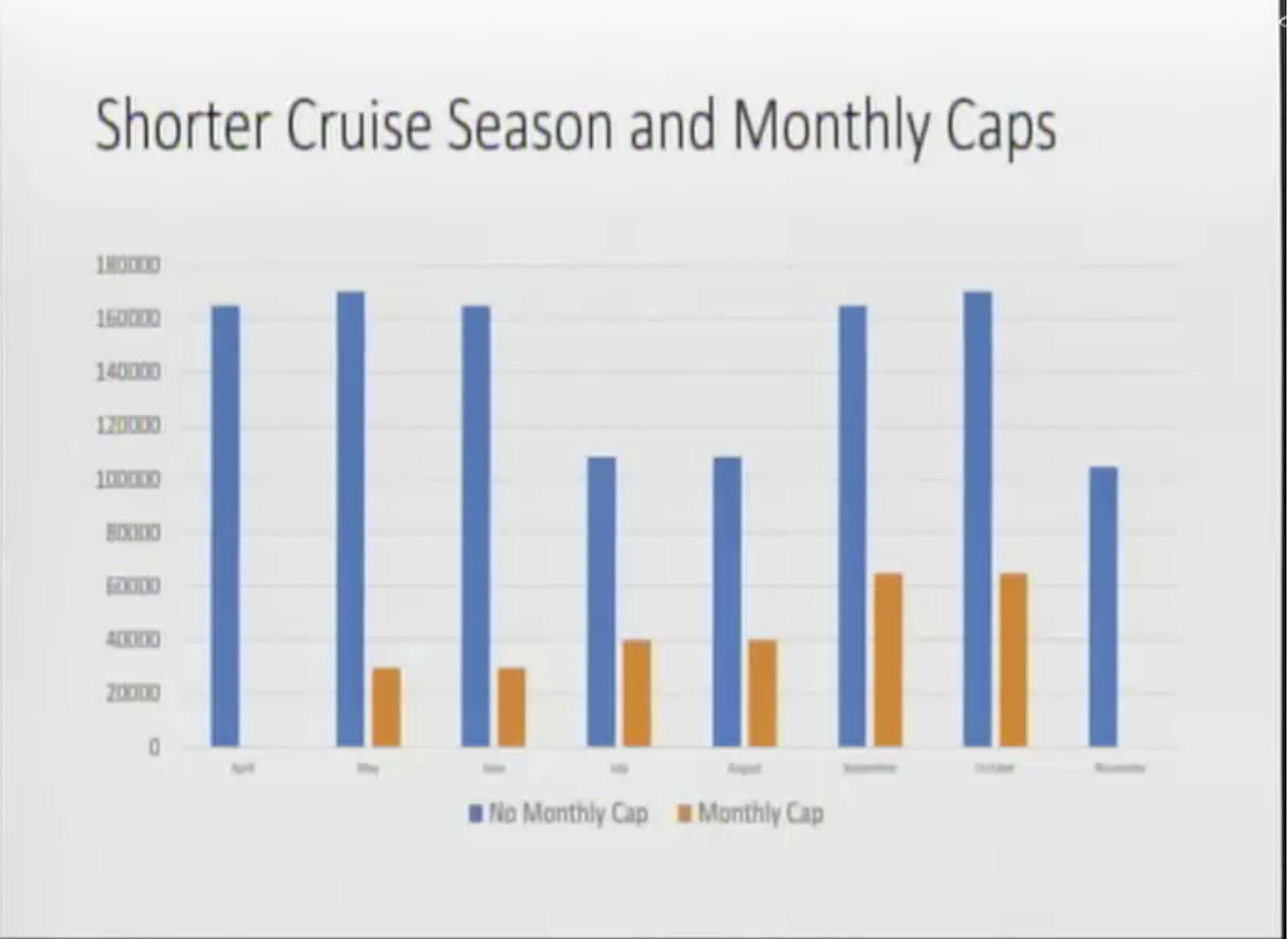Bar Harbor Will Vote on Cruise Ship Caps This November
Meanwhile town officials working with cruise ship industry has a different potential plan to decrease visits
Bar Harbor voters will decide on November 8 whether or not to cap daily cruise ship disembarkations to 1,000 passengers or less now that the town council moved 6-1 to put the petition on the November town warrant. Jeff Dobbs voted against.
Jeff Dobbs said that he was voting against the petition being on the agenda because it ‘undermines’ the work that the council has been doing on cruise ships.
Town Manager Kevin Sutherland later presented the work of the town’s cruise ship working group, which has a different set of caps and recommendations than those citizens will vote on in November.
Town Councilors could have put the petition on the warrant at its July 19 meeting, but chose to delay that decision until they consulted with attorneys to verify that the warrant itself is constitutional.
At the beginning of the August 2 meeting at the municipal building, town councilors went into executive session to discuss with the town attorney about the future actions about the citizens’ petition on cruise ship disembarkation. The session lasted roughly thirty minutes.
The petition was organized by resident Charlie Sidman and calls for limiting the number of disembarkations of cruise ship passengers to 1,000 a day. It also creates a new set of procedures for permits that property owners in town can be issued to accept disembarking passengers. If voted in, the system would require the town’s harbormaster to create a reservation system for transporting passengers off cruise ships and also creates a counting mechanism. Then the town’s code enforcement office would have to ensure compliance. Lack of compliance would be $100 per passenger who wasn’t authorized to disembark. The changes would go into effect after March 17, 2022, which means it would be a retroactive change.
At that July meeting, citizens spoke in favor and against the petition during the public meeting. Sidman referenced talk versus action when the town deals with cruise ships, saying, “I personally and I believe many people regard these attempts as too little and too late.”
At the August meeting, Councilor Matt Hochman made a motion to sign the order to place the motion onto the town meeting warrant. Chair Valerie Peacock said that the town’s charter clearly states that the council must do due diligence on petitions such as this one and they’ve done so in the past with petitions regarding marijuana. Since the council heard competing advice from attorneys, Peacock said, they postponed putting the petition on the agenda until after they spoke with the town attorney.
Hochman agreed, saying that the council members owe it to the tax payers and residents to make sure that what they’re putting on the warrant is legal and/or proper. He stressed that there was no orchestrated effort amongst government officials to keep the citizens’ petition from going on the warrant.
Councilor Gary Friedman said that the petition should have immediately gone to the voters. “This may not be a perfect initiative,” he said, but that it was the council’s duty was to put it on the ballot and have a dutiful and respectful debate about the reduction of cruise ship passengers, saying that he believes most people in Bar Harbor want that reduction. There were strong opinions on both sides of the issue at the council’s July 19 meeting.
Town Manager Presents The Option The Town Has Been Working On
At a Feb. 15 meeting, the council created a working group to negotiate with the cruise ship industry to reduce the number of cruise ship visits from 2023 and beyond.
Sutherland said, “This conversation about cruise ships started in the 1990s.” Back then, he said, the community wanted to extend the shoulder seasons and decided to encourage the cruise ships to come to Bar Harbor. There was a standard operating procedure developed during that time and it has been enacted for twenty years.
The harbormaster assigns anchorage according to the caps in the standard operating procedure. Sutherland said that “over the last five years, it’s really been the conversation about too many, too much, and too large.” Because of the complex maritime challenges and regulations, the town met with a maritime attorney to talk about what the town could do to address the issue.
“The town has limited, if any, regulatory power over cruise ships,” he said. The federal government is the main regulatory authority.
“There are 38 ports in Canada and Maine with Bar Harbor as the marquee destination,” he said. There are 26 Canadian ports, ten in Maine, twelve in the U.S. including Maine’s for these types of cruises that focus on the area. Bar Harbor along with Portland and Eastport are class A ports, which means that they are ports of entry from Canada.
Saint John is investing 70 million to attract cruise ships, he said. He added that the cruise ship industry representatives are telling him, “If Bar Harbor isn’t there, we probably aren’t going to happen anymore.” That means that if Bar Harbor drastically decreases cruise ship visits, other smaller communities may be impacted, he said.
He said that the size of the ship isn’t the only thing that determines impact. Customers on small ships are often using more tours and require more busses because of the selling of different tours on different cruise lines.
“We advocated for and were able to create monthly caps which help lessen the intensity,” he said about the group’s discussions with the industry. They would develop agreements with each cruise line that would be signed by the council rather than the hand-shake agreements of the past. And each season they would have an annual review.
The recommendations from the group include shortening the cruise season and creating daily caps between 3,500 to 3,800 between May and October with a cap of three ships each day.
Under the plan, the monthly caps would be 30,000 for May and June; 40,000 for July and August, and 65,000 for September and October. The harbormaster would have some flexibility on those caps. Ships with less than 200 lower berth passengers would be exempt from that daily maximum.
Sutherland asked the public to share questions or comments to him.
Chief James Willis said that they are using civilian staff to work crossing guards rather than police officers and that is monitored by Harbor Master Christopher Wharff. He said that the new tender set-up at the Harborside has taken busses off the street, which has helped. He said that the department has improved relationships with tenders, taxis, tour operators, and other businesses that interact with cruise ship passengers. When asked by Councilor Erin Cough, he said that there haven’t been complaints this season about busses causing congestion and believes that it has to do with tour company and private company cooperation and the finetuning that Lt. Wharff and others have made to the process.
Sutherland also presented some slides about how the proposed caps would impact the maximum case scenario, and also spread out the visits.
Sutherland said he’d like support from the council on the working group’s caps and “to authorize the harbormaster to allow the currently requested but not booked ships who meet the agreed upon limits to anchor in 2023.”
Cough asked if the cruise ship industry supports these changes. Sutherland said that they do. Councilor Jill Goldthwait was a member of the working group and said that they came a very long way in negotiations, which allows them to go forward without having to worry about the legal side.
MORE RESOURCES:
For an earlier article with more information about the citizens’ initiative to decrease cruise ship disembarkations, click here.
To watch the Aug 2 town council meeting in its entirety, click here.
To watch the last town council meeting in its entirety, click here.
Agendas for past meetings are here.
Cruise ship information is here.







